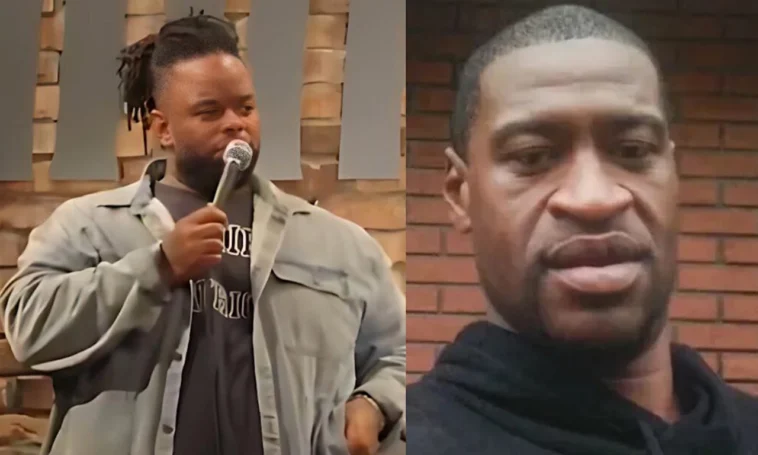David Lucas recently performed stand-up comedy at the Funny Bone Comedy Club in Manchester, Connecticut, causing controversy. Lucas’ insensitive jokes on Minneapolis police officer Derek Chauvin’s 2020 murder of George Floyd infuriated audience members, particularly Black ones.
Lucas’s insulting punchline and heckling of a Black audience member are at the heart of the incident.
Lucas said, “And you want to show them the reason why George Floyd got his neck kneeled on,” to audience screams.
One Black audience member accosted Lucas for his callousness and insensitivity while several Black attendees left in protest. Lucas continued his foul humor and made another terrible remark on Floyd’s untimely death despite the uproar.
Lucas has not apologized for his contentious remarks following the concert. He has promoted his upcoming performances and comedy special on social media despite criticism.
Critics say Lucas failed to raise awareness and discuss racial injustice and police violence on his platform. They contrast his approach with Dave Chappelle’s 2020 stand-up special, “8:46.” Chappelle addressed Floyd’s death and its cultural effects.
Chappelle’s special on institutional racism and police violence sparked discussions about race relations in America. Lucas’s comments about Floyd’s murder were considered crass and insulting, lacking the depth and complexity needed to address such difficult topics.
Lucas’ event mirrors a larger tendency of insensitivity and callousness un humor. Outrage and censure have followed comedians trivializing violence and oppressed populations, raising questions about free speech and public platform obligations.
George Floyd’s murder is mocked beyond stand-up comedy. Tucker Carlson’s 2023 racist rant compared Floyd’s murder to past police violence, a disgusting display of insensitivity.
Such rhetoric emphasizes the need for empathy, understanding, and accountability in public debate. Powerful people must show caution and empathy while discussing sensitive topics like racial injustice and structural oppression.
After performing at the Funny Bone Comedy Club in Manchester, Connecticut, comedian David Lucas sparked discussions on comedy’s bounds and the ethical implications of public speaking. Lucas’s comments about George Floyd’s death outraged many audience members, who view comedy as a venue to challenge social conventions.
The Lucas debate shows the fine balance between fun and harm, and the risks of trivializing important problems like racial injustice and police violence. In an era of social consciousness and accountability, comedians like Lucas are increasingly scrutinized for their jokes and their influence on vulnerable communities.
Lucas is criticized for ignoring structural racism and police violence victims. Lucas trivialized George Floyd’s murder, minimizing his family’s suffering and the national impact on communities of color.
The backlash was worsened by Lucas’s refusal to apologize or discuss his destructive words. He increased his foul humor, showing a lack of empathy and knowledge of his comments.
Conversely to Lucas, comedians like Dave Chappelle have used their platforms to promote social change and conversation by understanding comedy’s power dynamics. Chappelle’s “8:46” stand-up special, titled after Derek Chauvin’s prolonged assault on George Floyd’s neck, examined race, justice, and accountability in America.
Chappelle’s willingness to tackle tough topics and ability to spark thinking and introspection contrast with Lucas’s flippancy. Comedy can be used to address hard realities and challenge entrenched views, but it must be used properly and with consideration for audiences and communities.
Lucas’s performance scandal raises questions about comedy’s role in social transformation and confronting social injustices. Some say comedians should avoid censorship and political correctness, but others say they must examine the ethical implications of their jokes and their potential harm.
The argument over David Lucas’s George Floyd murder jokes is a microcosm of bigger discussions concerning comedy’s power dynamics and public platform duties. As society struggles with racial injustice and institutional oppression, comedians and entertainers must address sensitive topics with empathy, compassion, and a desire to promote understanding and dialogue.
In conclusion, David Lucas’s scandalous jokes about George Floyd’s murder highlight the power of words and the importance of cultural sensitivity in comedy and beyond. As audiences expect more accountability from entertainers and public people, Lucas must reflect on the impact of his words and aim for empathy, compassion, and diversity in his comedy.





One Comment
Leave a ReplyOne Ping
Pingback:Shaquille O'Neal Lusts Over Ice Spice After Super Bowl Encounter